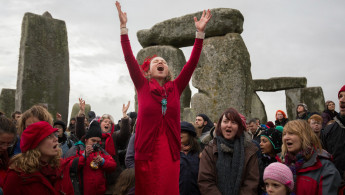Religious discrimination is unacceptable to Arabs
Religious discrimination is unacceptable to Arabs
Analysis: The largest public opinion survey across the Arab world has uncovered that while Arabs describe themselves as 'religious', they do not discriminate against members of other faiths.
2 min read
File Photo: Druids, pagans and revellers celebrate the winter solstice at Stonehenge in England [Getty]
The majority of Arabs do not discriminate on the basis of religiosity in their social, political and business interactions, a major study has found.
A new poll conducted by the Arab Center for Research and Policy Studies has uncovered that while most Arabs describe themselves as religious, they nonetheless oppose edicts which pass negative judgement against members of other faiths.
Arab public opinion is split over separating religion from the state, but more than seven out of 10 people in the Arab world agree that no person or group has the right to declare followers of other religions to be infidels, or which declare followers of varying interpretations of the same faith to be apostates.
Lebanon came first with 88 percent agreeing with this sentiment. Algeria came last out of the 12 Arab countries studied by the survey, with 43 percent.
The Arab Opinion Index is the fourth of a series of yearly public opinion surveys across the Arab world and the largest of its kind.
The 2015 study is based on the findings from face-to-face interviews conducted with 18,311 respondents in Saudi Arabia, Kuwait, Iraq, Jordan, Palestine, Lebanon, Egypt, Sudan, Tunisia, Algeria, Morocco and Mauritania.
|
||
While most respondents describe themselves as to some extent religious, they refuse to accept that non-religious people are by definition bad people.
A majority of Arabs are opposed to the employment of religion as a means by which government or electoral candidates win support but are split almost in half in their attitudes towards the separation of religion and state.
And 74 percent of respondents agree or strongly agree that the government does not have the right to use religion as a means of winning public support.
Individual morality and values rather than the observance of religious practices have been the defining attributes for religiosity according to most respondents.




